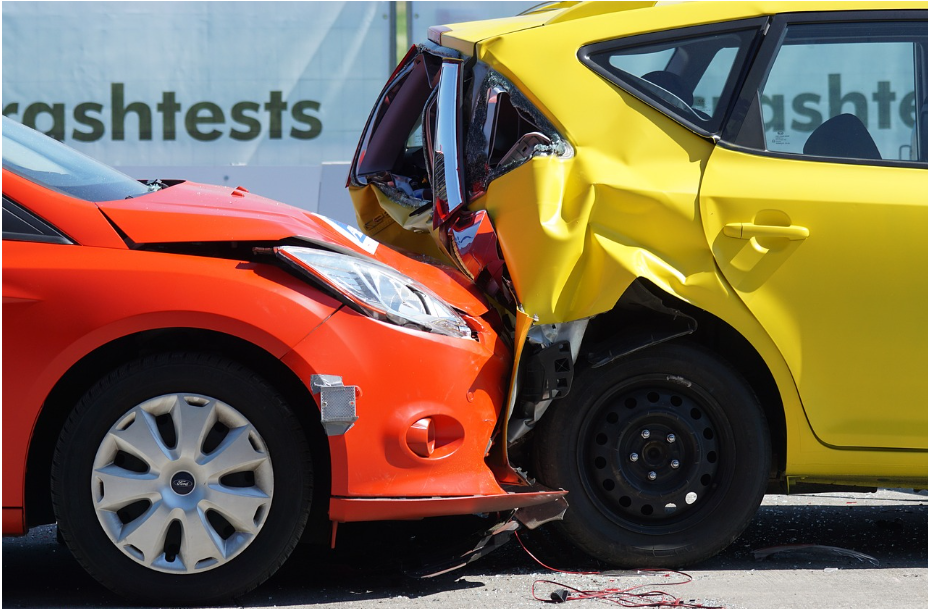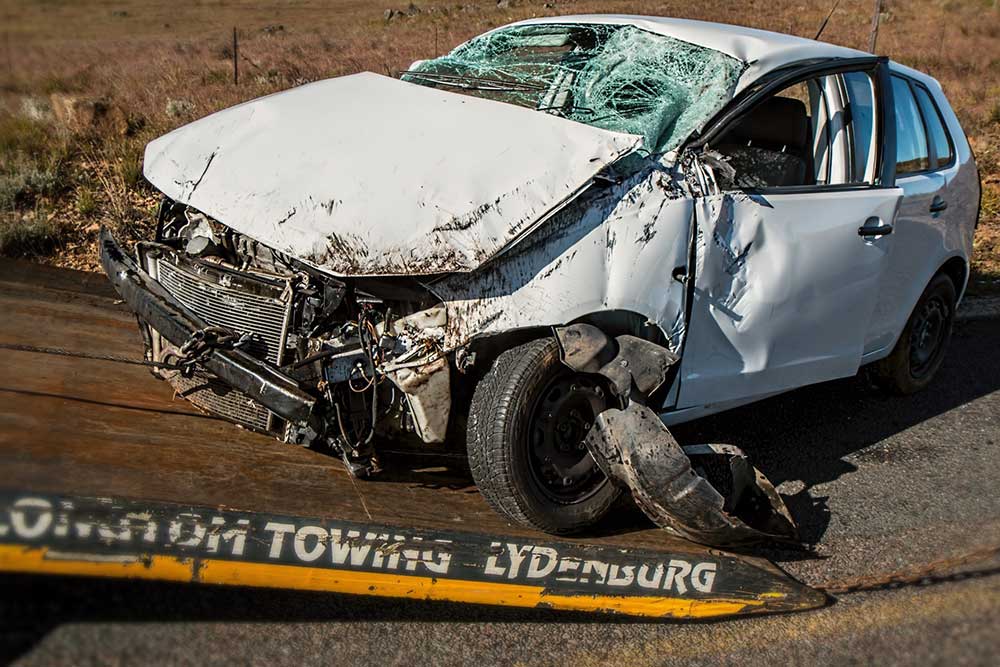
Can you sue for a rear-end collision? Although many people think they can’t sue in Massachusetts because it’s a no-fault state, the answer is yes.
Rear-end accidents can result in significant injuries and mounting medical and car repair bills. However, you can file a legal claim for compensation. That’s why knowing your rights is crucial.
Let’s discuss when you can sue, the evidence you must provide, and how to protect your rights after someone hits your car from behind in Massachusetts.
- What Is a Rear-End Collision?
- When Can You Sue for a Rear-End Collision?
- Proving Fault in a Rear-End Collision Lawsuit
- What If You Were Partially at Fault?
- Common Injuries in a Rear-End Collision
- Common Car Damages in a Rear-End Collision
- Types of Damages That Can Be Recovered After a Rear-End Collision
- Get a Free Case Evaluation
- How Can a Rear-End Collision Lawyer Help?
- Contact a Car Accident Lawyer Today!
- 30-Day, Risk-Free Guarantee
What Is a Rear-End Collision?
A rear-end collision happens when one vehicle strikes the rear of another one. Often, it happens because a driver is following the car ahead too closely and can’t stop when traffic slows down. Distracted driving is also a common cause: a motorist behind may be texting, adjusting the radio, or even falling asleep behind the wheel. Bad weather conditions like rain or ice can make a road slippery and also play a role.
Sometimes, the underlying issue is poor car maintenance or defective parts. Worn-out brakes or tires can prevent a vehicle from stopping when it should. There are also cases where sudden, unexpected stops by the front vehicle lead to the collision.
The alarming car accident statistics show a worrying trend on our roads. Rear-end collisions are some of the most common and risky types of accidents.
What makes these car accidents particularly tricky is that they can happen at any speed. This can be a small bump in slow traffic and even a hard hit at a high speed. The damage can be serious in both scenarios.
When Can You Sue for a Rear-End Collision?
In Massachusetts, you can take legal action if someone rear-ends your vehicle. But there are some rules to keep in mind.
First, your own insurance company has to cover your medical bills within the Personal Injury Protection or PIP. The insurance policy should reimburse you up to $2,000 before you can pursue the at-fault party. If your injuries are serious, though, you can definitely sue the driver who hit you.
You can pursue a lawsuit if your medical expenses exceed $2,000 or if you’ve suffered specific serious injuries. These include broken bones, loss of sight or hearing, and even more severe ones, like a loss of a body part.
Keep in mind that you only have three years from the date of your collision to file a lawsuit in Massachusetts. If you wait longer, you’ll lose your chance to get compensation.
What’s also worth mentioning is that PIP coverage only provides up to $8,000 for all costs, including up to 75% of lost wages. If your damages exceed these figures and meet the above criteria, a lawsuit might be your best path to get back all the money you’ve lost.
Proving Fault in a Rear-End Collision Lawsuit
To win a lawsuit for a rear-end collision in Massachusetts, you have to prove the other driver is at fault for the rear-end crash and your injuries. You need several types of evidence:
- The police report from the accident scene, which explains what happened from an officer’s viewpoint.
- Video evidence footage from traffic cameras, dashcams, or nearby security cameras, which shows exactly how the crash occurred.
- Photos of the crash scene to demonstrate the damage to both cars, road conditions at the time of the rear-end collision accident, any skid marks on the road after, and the whole scene.
- Statements from witnesses who saw the crash to back up your story about what happened and who was at fault.
- Your medical records, which prove your injuries came from this crash and show how serious they are.
In complicated cases, auto accident reconstruction experts can examine all the evidence and explain exactly how the crash happened. They can also determine fault if there were several parties involved in the accident.
What If You Were Partially at Fault?
In Massachusetts, you can still recover compensation for your damages if you were partly at fault for the rear-end crash. But there’s a catch: you can only get compensation if you were 50% or less to blame for what happened.
To explain further: if you were partially at fault for the crash — say because you had broken brake lights or you just stopped suddenly without reason — the compensation you can get will be reduced based on how much the crash was your fault. Here’s a simple example: if your total damages are $100,000, and you are 20% liable, you would get $80,000.
But if you’re found to share more than half of the fault for the crash (51% or more), you can’t get any money at all from the other driver. This is why it’s essential to gather as much evidence as possible to prove that the other driver was primarily responsible for the crash. The lawyer’s role will be to demonstrate that the rear-end collision accident wasn’t caused by you and that the other driver wasn’t following traffic rules.
Common Injuries in a Rear-End Collision
Even a minor rear-end accident can cause serious bodily injury to those involved in the accident. This happens due to a sudden jolt of the body. Even with seatbelts on, our heads and bodies still feel the pressure. Let’s look at the most common injuries that can happen when someone hits a car from behind:
- Whiplash: This is the most common rear-end collision injury. Sudden forward and backward movement of the head can strain or tear the muscles and ligaments in the neck. Whiplash can cause severe pain, stiffness, and headaches that last for months.
- Traumatic brain injuries (TBI): The brain can suffer damage when the head is suddenly jolted. Even if the driver doesn’t hit their head, the force itself can make the brain move within the skull, leading to a car accident concussion or even more serious brain injuries.
- Spinal disc injuries: The impact strength can squeeze or rupture the discs in a spine. A herniated disc happens when the soft inner part protrudes through the outer tough layer. This causes intense pain and numbness.
- Pinched nerves: The impact can also make vertebrae press on nerves in the spine. This compression can lead to sharp, shooting pain.
- Face and head injuries: Even with airbags and headrests, it’s still possible for a face to come into contact with the steering wheel or dashboard. This can result in cuts, bruises, broken facial bones, and dental injuries.
Common Car Damages in a Rear-End Collision
When your car gets hit from behind, it can sustain different kinds of damage. Here’s what you should watch out for after a rear-end collision:
- Bumper damage: A damaged bumper isn’t just a visual nuisance but also a safety concern. Your bumper is your vehicle’s first line of defense in any potential collisions. Even if the damage looks minor, the bumper might not protect you properly in another car accident.
- Electrical issues: If the tail lights, brake lights, or backup camera act strangely after getting rear-ended, it could make it difficult for other drivers to see when you’re stopping or turning. That raises the chances of another accident.
- Alignment problems: Your car might start veering to one side, even when you’re trying to go straight. That’s a clue that your wheels aren’t aligned anymore. This could wear your tires out faster (costing you money) and can make your vehicle harder to control in an emergency.
- Hidden structural damage: Damage to your car’s frame might not be visible immediately. However, if you get into another accident later, these weak spots mean your car may not be able to protect you and other passenger in a car accident as well as it should.
Types of Damages That Can Be Recovered After a Rear-End Collision
In Massachusetts, you can recover various types of damages after a rear-end car accident, provided you meet the state’s threshold requirements for filing a lawsuit.
The first type of damages you can recover is economic damages. These include:
- All medical expenses beyond your PIP coverage
- Lost wages (beyond the 75% covered by PIP)
- Future medical costs (on physical therapy, for example)
- Lost earning capacity if you can’t return to your previous job
- Property damage, such as car repairs
- Out-of-pocket expenses for transportation or home modifications
- The cost of hiring an assistant to help with housework you can’t do.
Non-economic damages compensate you for non-monetary losses, which can include:
- Pain and suffering
- Emotional distress
- Physical impairment or disfigurement
- Loss of enjoyment of life
- Loss of consortium (impact on your relationship with spouse).
As we’ve already mentioned, you must first use your PIP insurance, which pays up to $8,000 for medical bills and lost wages. After that, if your medical bills are over $2,000 or you have serious injuries, you can pursue full compensation for all these damages.
Overall, your compensation may be affected by several factors:
-
The severity of your injuries
-
Your percentage of fault (if any)
-
The available insurance coverage
-
The strength of your evidence
-
The impact on your daily life and future
Building strong personal injury cases is not easy. A good rear-end collision car accident lawyer can help you recover the compensation you deserve under Massachusetts law.

Get a Free Case Evaluation
How Can a Rear-End Collision Lawyer Help?
After a rear-end crash in Massachusetts, you likely have a lot on your plate in terms of losses, such as your injuries and car repairs. Luckily, you can leave your legal concerns to experienced personal injury lawyers.
They will help you determine whether you can sue for a rear-end collision and how to get the highest compensation possible. Most importantly, your car accident lawyer knows what your case is actually worth. They will accurately calculate your medical treatment bills and take non-economical damages into account.
What’s more, insurance companies often try to minimize your personal injury claim by suggesting you are partly liable. A good personal injury attorney will gather witness statements and other evidence needed to show exactly what happened, determine the liability of the responsible party, and negotiate with the insurance provider.
Contact a Car Accident Lawyer Today!
Insurance, medical bills, and paperwork are the last thing you want to think about after a crash. That’s exactly why we’re here. Our Boston legal team has helped countless rear-end accident victims achieve a fair settlement and get their lives back on track.
Our rear-end collision attorneys are well-versed in the intricacies of Massachusetts traffic laws and car accident legislation, and we’ll use this expertise for the benefit of your personal injury case. Michael Kelly Injury Lawyers offer a free case review to understand your situation and your legal options.
Massachusetts law puts strict time limits on accident claims. So, don’t hesitate to contact us — we’re ready to start fighting for the financial recovery you deserve!






